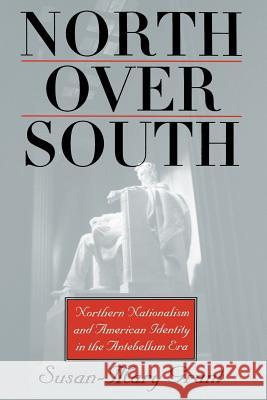North Over South: Northern Nationalism and American Identity in the Antebellum Era » książka
North Over South: Northern Nationalism and American Identity in the Antebellum Era
ISBN-13: 9780700614257 / Angielski / Miękka / 2000 / 264 str.
North Over South: Northern Nationalism and American Identity in the Antebellum Era
ISBN-13: 9780700614257 / Angielski / Miękka / 2000 / 264 str.
(netto: 110,53 VAT: 5%)
Najniższa cena z 30 dni: 111,00
ok. 30 dni roboczych
Bez gwarancji dostawy przed świętami
Darmowa dostawa!
In most studies of nationalism, the United States is curiously ignored or is examined only during its colonial and republican periods. But it was the Civil War, argues Susan-Mary Grant, that truly formed the American nation by unifying the states once and for all, abolishing slavery, and setting the country on the path to modernity. In light of this, says Grant, the antebellum period was the crucial phase of American national construction. In North Over South, Grant offers an original and controversial interpretation of a much discussed but poorly understood period of American history. Despite the attention generally given to Southern nationalism, Grant focuses on what Northerners thought about the South and how their beliefs created a distinct outlook: a Northern nationalism based on opposition to things Southern.
Grant identifies Northern views of the South between 1830 and 1856 and examines how they developed, how they changed, and how they were used by the Republican Party in its first national election campaign. She demonstrates that the Republicans employed negative images of the South to transform Northern regionalism into a self-styled "American nationalism"--at the same time transforming the South into a region antithetical to the nation. In support of this thesis, Grant examines attitudes toward the South expressed by writers, travelers, and politicians. Focusing on works of such prominent writers as Ralph Waldo Emerson, William Cullen Bryant, and Horace Mann, she shows that the North used the South as a negative point of reference against which to define its own--hence American--identity, effectively excluding the South from full participation in the process of American national construction. This provocative study links the process of national construction in America with recent studies of European nationalism and fills a gap in the historiography of North-South relations. One of the first scholars to relate new theories of national construction to America, Grant shows that the United States has more in common with the European experience than is often acknowledged and offers a unique and illuminating perspective on the process of American nation-building. Her book will be required reading for anyone interested in antebellum America and the origins of the Civil War.










